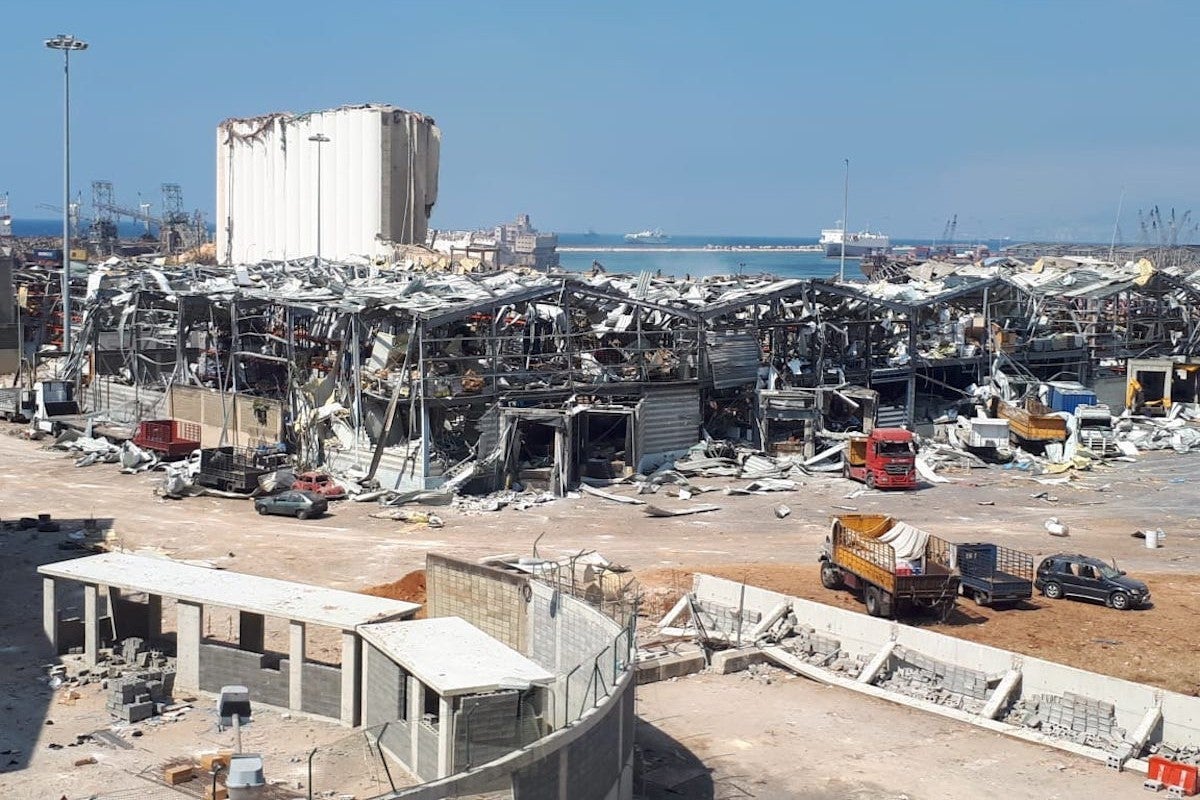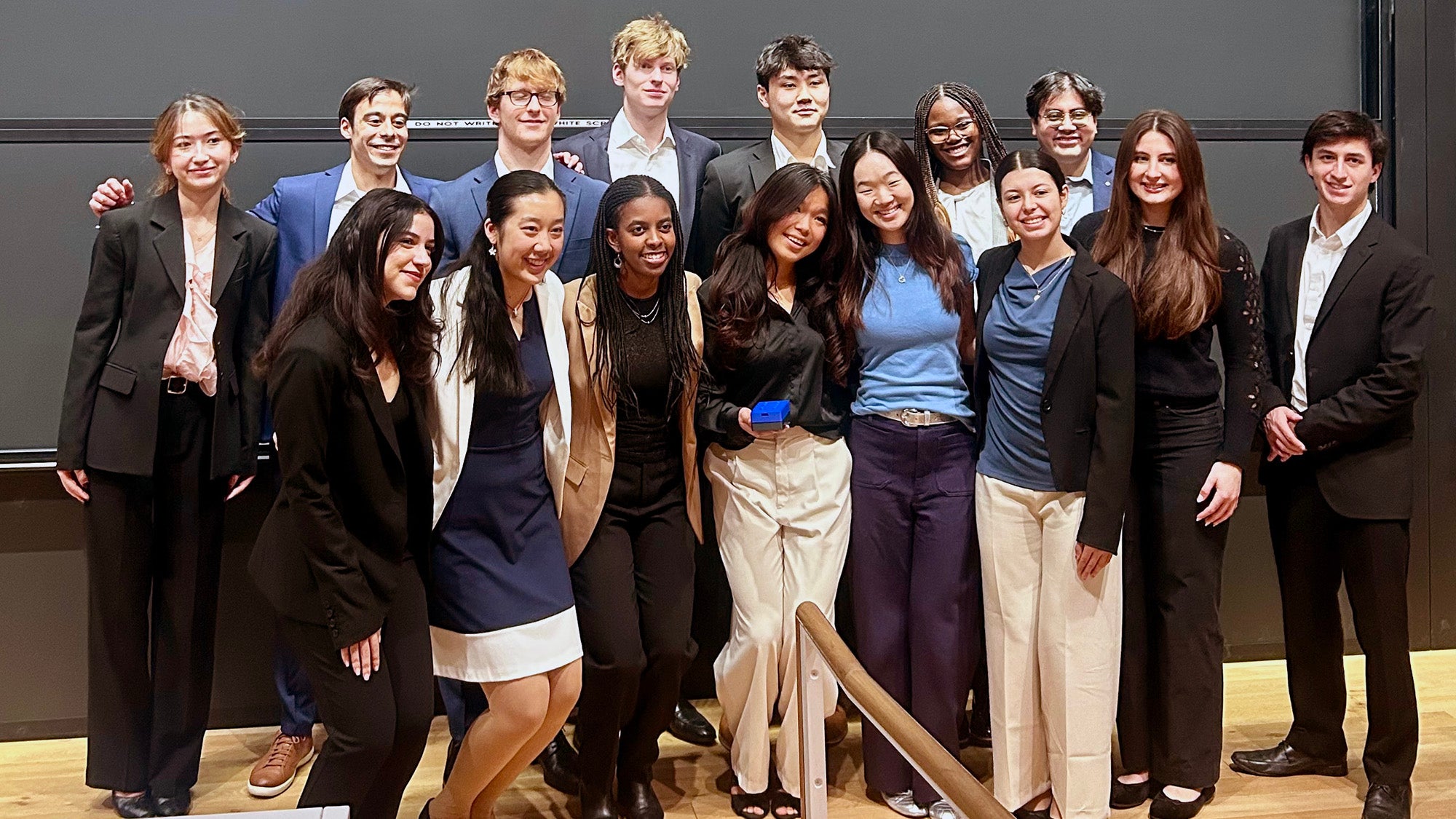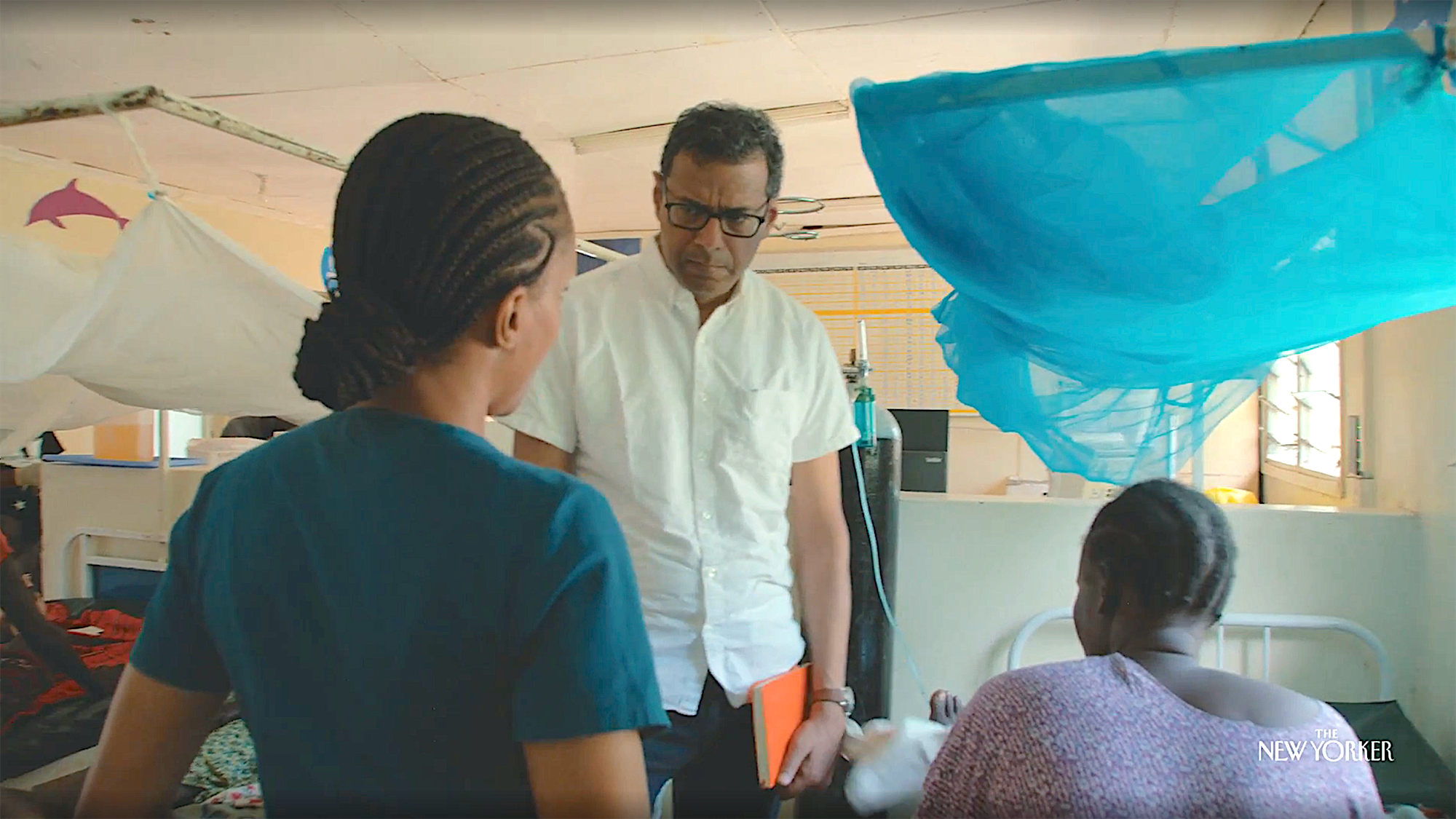Beirut blast sends Lebanon into crisis mode

In the wake of devastating explosions in Lebanon’s capital, alumna Ghada El-Hajj Fuleihan of the American University of Beirut reaches out to Harvard Chan faculty and alumni as she works to ensure that education, research, funding, and training of future health care professionals continues
September 15, 2020 – On August 4, shortly after 6:00 pm, Ghada El-Hajj Fuleihan, MPH ’97, was in her apartment in a Beirut high rise facing the Mediterranean, on a Zoom call, when her building started to swing sideways, like a pendulum, for a few seconds. She thought it was an earthquake.
El-Hajj Fuleihan—a professor of medicine and academic leader from the American University of Beirut (AUB), and a Bernard Lown Scholar at Harvard Chan School—and her family weren’t hurt and her apartment didn’t suffer any significant damage. But when she turned on the TV and saw video of the two explosions at the Port of Beirut, one of which produced a gigantic mushroom cloud, she was horrified.
She rushed to the emergency room of the AUB Medical Center to help patients and their families who had called her asking for help because they were unable to reach loved ones. “There were deafening sounds of sirens as ambulances made their way to nearby ERs, piles of broken glass bordered our new ambulatory care center, and dozens of people stood at the entrance inquiring about friends and family,” she said. “I’d never seen so much blood, so much chaos, so much fear. The emergency rooms were overflowing into the corridors. I’m an endocrinologist, not a trauma expert or surgeon, but was busy for hours coordinating care for my patients between ER physicians, neuro-radiologists, neurosurgeons and orthopedic surgeons, house staff, and nursing staff.”
The blasts, caused by the ignition of a huge stockpile of ammonium nitrate stored unsafely in the Port, is thought to be one of the most powerful non-nuclear explosions in history. The destruction was massive. It killed about 200 people, injured more than 5,000, and left as many as 300,000 homeless in a city that is home to 2 million. Were it not for the port’s tall grain silos and the sea—both of which absorbed most of the shock of the explosions—the devastation could have been much worse, according to news reports. In areas surrounding the blast site, buildings—many of them historic—were flattened like dominoes, and many more had their windows blown out. The Port, which had handled roughly 80% of vital imports such as food staples and medicines, was largely destroyed. “Large proportions of the national supply for essential medications evaporated,” said El-Hajj Fuleihan. Several hospitals were badly damaged, “a catastrophe in the midst of COVID-19 and rising numbers of affected cases,” she said.
To make matters worse, the disaster took place during a time when Lebanon was already struggling with deep economic problems—the devaluation of the local currency, unemployment, and high inflation—brought on by decades of political corruption, in a country severely weakened by regional political instability, El-Hajj Fuleihan said.
Early estimates to rebuild Beirut are $10 billion to $15 billion. The AUB campus and medical center sustained several million dollars’ worth of damage, according to AUB president Fadlo Khuri.
In the wake of the explosions, El-Hajj Fuleihan is working with faculty and alumni at Harvard Chan School to ensure that AUB continues in its capacity building of much-needed health care talent.
“Amid Lebanon’s collapsing economy and a notable exodus of professionals from the country, my utmost concern is that education, research, funding, and training of future generations will severely suffer,” said El-Hajj Fuleihan. Within a week of the explosion, she reached out to Harvard Chan Dean Michelle Williams, faculty, and alumni. “The response in solidarity was immediate and heartwarming,” she said. Since then, the group has been discussing potential support and collaborations.
El-Hajj Fuleihan directs two programs at AUB—the Scholars in HeAlth Research Program (SHARP), which provides graduates with a foundation to pursue a career in clinical and translational research, and the Calcium Metabolism and Osteoporosis Program, a center of expertise for metabolic bone disorders. To help keep these and other programs vibrant, she has connected with several Harvard Chan School researchers and fellow Lebanese alumni to brainstorm ways to support research, education, and training for Lebanese researchers, with a focus on addressing problems arising from the crisis, in areas such as disaster relief, food security, poverty, mental health, environmental health, COVID-19, and cardiovascular health.
Among those she has reached out to are Goodarz Danaei, Bernard Lown Associate Professor of Cardiovascular Health at Harvard Chan School, and Akl Fahed, MPH ’15, a cardiologist and scientist at Massachusetts General Hospital and Harvard Medical School.
Danaei directs the Lown Scholars program, which supports 75 senior and mid-career health professionals from developing countries who work on cardiovascular disease prevention. There are already three Lown Scholars from Lebanon, including El-Hajj Fuleihan, and Danaei said that he hopes to recruit more. He noted that, since March 2019, the program has been helping fund a project led by El-Hajj Fuleihan on the health impacts of air pollution and lifestyle factors on mothers and children in Beirut, and is also collaborating on an ongoing NIH-funded training grant with El-Hajj Fuleihan and colleagues to help nurture the next generation of researchers in Lebanon.
Fahed noted that, earlier this year, two medical graduates from the SHARP program were chosen for postdoc fellowship positions at the Massachusetts General Hospital Heart Center and the Broad Institute Cardiovascular Disease Initiative. Now he is planning further research collaborations with SHARP students and their mentors at AUB. “Mentoring student researchers from Lebanon is a powerful way to make impact exponentially during times of crisis,” he said.
El-Hajj Fuleihan also connected with Teresa Chahine, SD ’10, senior lecturer in social entrepreneurship at Yale University, and David Rogers, director of alumni affairs at Harvard Chan. Chahine is offering her fall course on Social Entrepreneurship in Public Health, which will be taught online, to AUB students at no charge. Rogers helped by sharing information with alumni on where to consider making donations to support relief efforts in Beirut, such as the Lebanese Red Cross, Impact Lebanon, the International Rescue Committee, the World Food Program, and AUB.
In spite of the devastation that occurred on August 4, El-Hajj Fuleihan expressed confidence that the situation will improve. “Lebanon, AUB, and the Lebanese will surely rise and prevail again,” she said. “This is what we resolute and resilient people do best.”
photo: Freimut Bahlo/Wikimedia Commons


